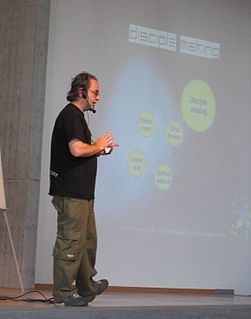A Quote by Leonard Sweet
One can be a faithful disciple of Jesus Christ without denying the flickers of the sacred in followers of Yahweh, or Kali, or Krishna. A globalization of evangelism 'in connection' with others, and a globally 'in-formed' gospel, is capable of talking across the fence with Hindu, Buddhist, Sikh, Muslim - people from other so called 'new' religious traditions ('new' only to us) - without assumption of superiority and power
Quote Topics
Across
Assumption
Buddhist
Capable
Christ
Connection
Denying
Disciple
Evangelism
Faithful
Fence
Followers
Formed
Globalization
Globally
Gospel
Hindu
Jesus
Jesus Christ
Kali
Krishna
Muslim
New
Only
Other
Others
People
Power
Religious
Religious Traditions
Sacred
Superiority
Talking
Traditions
Us
Without
Yahweh
Related Quotes
Only the gospel can truly save you. The gospel doesn't make good people good; it makes dead people alive. That's the difference between the gospel of Jesus Christ and every other world religion. All the others exhort their followers to save themselves by being good, by conforming their lives to whatever their worshiped deity is. But the gospel is God's acceptance of us based on what Christ has done, not on what we can do.
Jesus represents a point of common ground an esteemed rabbi to the Jew, a god to the Hindu, an enlightened one to the Buddhist, a great prophet to the Muslim. Even to the New Age guru, Jesus is the pinnacle of God-consciousness. At the same time, Jesus is the divider. None but Christians see Him as a member of the Godhead on an exclusive mission to repair the broken world.
When I am engaging with people of other religious faiths, I find myself unable to commit to their conclusions or agree with their assessments. Yet at the same time I come away encouraged by spiritual truths found in their traditions, thrilled by new insights into my own faith, and more passionate than ever about being a disciple of Christ.
Called on the people of New Hampshire . . . to confess before God their aggravated transgressions and to implore His pardon and forgiveness through the merits and mediation of Jesus Christ . . . [t]hat the knowledge of the Gospel of Jesus Christ may be made known to all nations, pure and undefiled religion universally prevail, and the earth be fill with the glory of the Lord.
I often say that I'm a Buddhist-Episcopalian. I say that partly to annoy people.I like to annoy people who think that a religion can contain the whole truth. No religion, it seems to me, contains the whole truth. I think it's mad to think that there is nothing to learn from other traditions and civilizations. If you accept that other religions have something to offer and you learn from them, that is what you become: a Buddhist-Episcopalian or a Hindu-Muslim or whatever.
Whether [new Protestant church movements] place their emphasis on new worship styles, expressions of the Holy Spirit’s power, evangelism to seekers, or Bible teaching, these so-called new movements still operate out of the fallacious assumption that the church belongs firmly in the town square, that is, at the heart of Western culture. And if they begin with this mistaken belief about their position in Western society, all their church planting, all their reproduction will simply mirror this misapprehension.
The capacity to be alone is the capacity to love. It may look paradoxical to you, but it is not. It is an existential truth: only those people who are capable of being alone are capable of love, of sharing, of going into the deepest core of the other person without possessing the other, without becoming dependent on the other, without reducing the other to a thing, and without becoming addicted to the other.
Sheer scholarship alone cannot reveal to us the gospel of grace. We must never allow the authority of books, institutions, or leaders to replace the authority of KNOWING Jesus Christ personally and directly. When the religious views of others interpose between us and the primary experience of Jesus as the Christ, we become unconvicted and unpersuasive travel agents handing out brochures to places we have never visited.
Christianity has always been against the flow of culture and continues to call us in the opposite direction of the way the world is heading. Instead of falling in love with ourselves, Christ followers are called to deny themselves. Instead of trusting in the power they possess, they are called to surrender to God's higher power. Instead of looking within for the answers in life, they are called to acknowledge that His ways are higher. The decision to follow Christ has always been an "all or nothing" decision. There's no way to stand up to the world while you're trying to straddle the fence.
We cannot avoid the globalization of knowledge and information. When I was a boy growing up in Kansas, I could never think about a Buddhist, or a Hindu, or Muslim, or even a Protestant - I grew up in such a Catholic ghetto. That's not possible anymore, unless you live in a cave or something. So either we have knowledge of what the other religions and other denominations are saying, and how they tie into the common thread, or we end up just being dangerously ignorant of other people and therefore prejudiced.






































